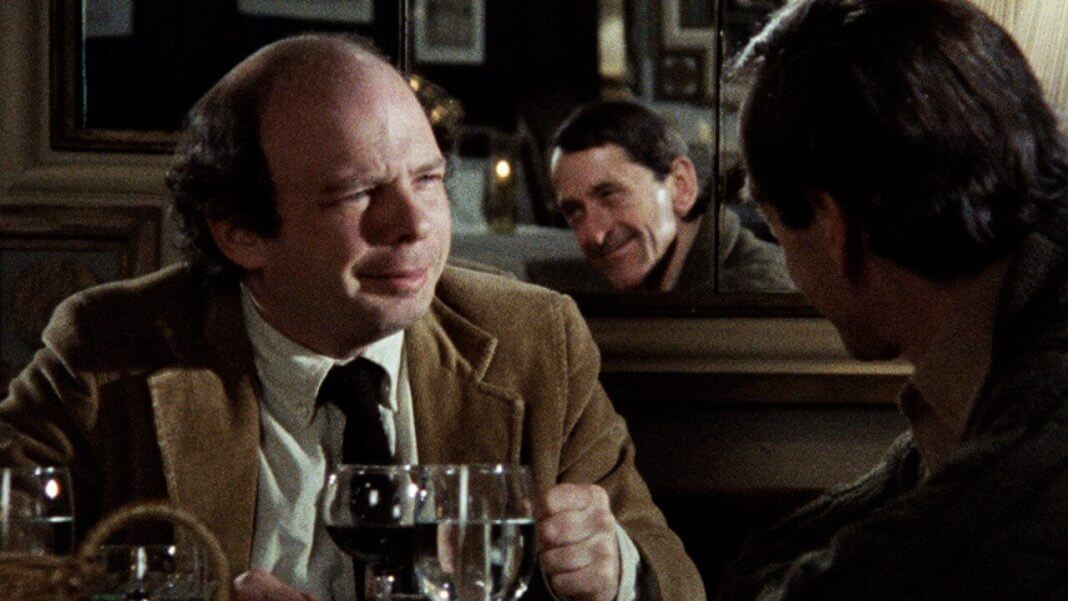基本介绍:
《与安德烈晚餐》是由路易·马勒(Louis Malle)执导的影片, 整部影片讲的就是一个演员兼编剧跟一个导演在餐桌上讨论各种人生话题,有很强的思辨性。
英文简介:
Two old friends meet for dinner; as one tells anecdotes detailing his experiences, the other notices their differing worldviews.
[toggle title=谷歌翻译,仅供参考]
两位老朋友聚在一起吃晚饭;一位讲述了他经历的轶事,另一位则注意到他们不同的世界观。
[/toggle]
最火台词:
Andre: A baby holds your hands, and then suddenly, there’s this huge man lifting you off the ground, and then he’s gone. Where’s that son?
(全部台词)
幕后花絮:
这部低成本的电影是在弗吉尼亚的一家废弃的旅馆中拍摄的,时间是冬天。有个制片人回忆当时说:“由于我们没有钱给旅馆供暖,(制片人伯弗利·贝利斯·卡普)时不时给我来一点白兰地酒”。工作人员都穿着厚重的滑雪服来保暖。演员们都要表演出暖和的天气,只好在灯光和长内裤中取暖了。
图书摘录:
一部大胆的实验之作,描写一个演员兼编剧跟一个导演在餐桌上讨论各种人生话题,有很强的思辨性。但你若对文化界人士侃大山没兴趣的话,这可能是最乏味的影片之一(周黎明《西片碟中碟》)
精彩对白:
Wally: I’ve lived in this city all my life. I grew up on the Upper East Side. And when I was ten years old, I was rich, I was an aristocrat. Riding around in taxis, surrounded by comfort, and all I thought about was art and music. Now, I’m 36, and all I think about is money.
沃利:我的一生都住在这个城市。我在阳光上东区出生。当我十岁的时候,我很富有,我是一个贵族。打出租车到处转悠,周围的环境很舒适,我所考虑的问题都是与艺术和音乐有关的。现在我36岁,我考虑的所有问题都是钱。
Wally: I was beginning to realize that the only way to make this evening bearable, would be to ask Andre a few questions. Asking questions always relaxes me. In fact, I sometimes think that my secret profession is that I’m a private investigator, a detective. I always enjoy finding out about people. Even if they are in absolute agony, I always find it very interesting.
沃利:我开始认识到,要想让这个下午轻松打发过去,唯一的办法就是想安德鲁问一些问题。向他提问能让我敢到放松。事实上,有的时候我觉得自己的秘密职业应该是一个私家侦探,调查员。我总是沉浸在找人的快乐之中。即使他们陷入完全地痛苦,我还是觉得这很有意思。
Andre: Remember that moment when Marlon Brando sent the Indian woman to accept the Oscar, and everything went haywire? Things just very rarely go haywire now. If you’re just operating by habit, then you’re not really living.
安德鲁:记住那一刻,当马龙?白兰度让印度妇女去接受奥斯卡奖杯的时候,天下大乱了吗?现在已经很难天下大乱了。如果你正在被自己的习惯操纵着,那么你并不是在真正的生活。
Andre: What does it do to us, Wally, living in an environment where something as massive as the seasons or winter or cold, don’t in any way affect us? I mean, were animals after all. I mean… what does that mean? I think that means that instead of living under the sun and the moon and the sky and the stars, we’re living in a fantasy world of our own making.
安德鲁:这和我们有什么关系,沃利,生活在有个和四季或者是冬天或者是寒冷一样丰富的环境中,能以什么方式影响到我们吗?我是说,毕竟都是动物。我是说…那有什么意义呢?我认为其中的意义是,我们生活在一个由自己创造出来的幻想世界,而不是生活在一个有太阳有月亮有星星有蓝天之下的世界。
Wally: Yeah, but I mean, I would never give up my electric blanket, Andre. I mean, because New York is cold in the winter. I mean, our apartment is cold! It’s a difficult environment. I mean, our life is tough enough as it is. I’m not looking for ways to get rid of a few things that provide relief and comfort. I mean, on the contrary, I’m looking for more comfort because the world is very abrasive. I mean, I’m trying to protect myself because, really, there’s these abrasive beatings to be avoided everywhere you look!
沃利:是的,但是我想说,我永远不会放弃我的电热毯,安德鲁。我是说,因为纽约的冬天很冷。我是说,我们的房子很冷。这是很糟糕的一个环境。我是说,我们的生活充满了艰辛。我不想试图想办法摆脱一些东西,那些能够给我带来安慰和舒适的。我是说,恰恰相反,我正在寻找更舒适,因为这个世界冷冰冰的。我是说,我正试着保护自己,因为,实际上,你看着的每一个地方都要避免被冷冰冰的打击击中。
Andre: But, Wally, don’t you see that comfort can be dangerous? I mean, you like to be comfortable and I like to be comfortable too, but comfort can lull you into a dangerous tranquility.
安德鲁:但是,沃利,你不认为安逸能带来灾难?我是说,你喜欢舒适的,我也喜欢舒适的,但是安逸能让你陷于一种宁静的危险之中。
Andre: I wouldn’t put on an electric blanket for any reason. First, I’d be worried if I get electrocuted. No, I don’t trust technology. But I mean, the main thing, Wally, is that I think that kind of comfort just separates you from reality in a very direct way.
安德鲁:无论如何我都不会装上电热毯。首先,如果通上电源,我会很担心。是的,我不相信科技。但是我想说,最主要的事情是,沃利,是我想那种安逸只能以一种非常直接的方式,把你从现实生活中分离出来。
Wally: [going home in a taxicab] I treated myself to a taxi. I rode home through the city streets. There wasn’t a street, there wasn’t a building, that wasn’t connected to some memory in my mind. There, I was buying a suit with my father. There, I was having an ice cream soda after school. And when I finally came in, Debbie was home from work, and I told her everything about my dinner with Andre.
沃利:(坐出租汽车回家)我请自己坐出租车。我骑着车穿过街道回到家。那儿不是一条街,那儿是一栋建筑,那和我的某些回忆并没有任何关系。在那里,我和父亲买了一套衣服。在那里,放学后我喝了一瓶冰淇淋苏打水。最后我回到了家里,黛碧也下班回到了家,然后我告诉了她,和安德鲁吃饭的所有事情。
























坦白说,这顿影史上最著名的晚餐确实有点挑战我的耐心了。所谓晚餐,其实是两个人的一场高端的、思辨的对话,安德烈是这场对话的主宰。与其他单一场景电影不同,该片几乎没有情节或者戏剧冲突,纯粹就是一场东拉西扯的对话。这是一部实验性作品,也许很少人会认真看完,但其已经且必定对后世影响深远。
朋友,仅仅一个轨道运镜,你就失去了你努力半天试图打造的“realism”——没有秘密,过于安全。诚然非常写实也足够展现对话中消失的时间,但更多像是自问自答(Filmed dialogue),一个真正电影的对话必然揭露一些关于对话本身的肌理,而不只是写在剧本里的布莱希特和监狱理论们,这也是区分马勒与真正的新浪潮,对话与filmed dialogue的关键区别。
这样的剧本似乎不是写而根本就是聊出来的。从奇幻故事到联系生活最后推向哲理高度。一气呵成。像极了之前修的一门课。晚上六点到九点四十五。教授进来胡乱点个名就开始幽暗的灯光下各种玄聊。现在想来那是至今最有启发的一节课。每次下课都似乎能写个剧本。
画面上是两个老男人喋喋不休,但观众却可以看到荒山、丛林、坟墓、僧侣,看到假象之下的荒谬、幻想之后的庸常。所谓剥除陈词滥调的“里世界”…..影片拍摄看似不动声色,却四两拨千斤,微妙动人至极
你以为你在努力的生活,其实不过是拼命的生存罢了。你往嘴里送食物,究竟是饥饿还是只是习惯。有时候在生活里反而看不清生活,所以有人远行有人逃离。科学是否真的能解释一切,究竟科学是创造了事物还是破坏了东西。预测究竟是巧合还是未来真的能给现在传递信息。